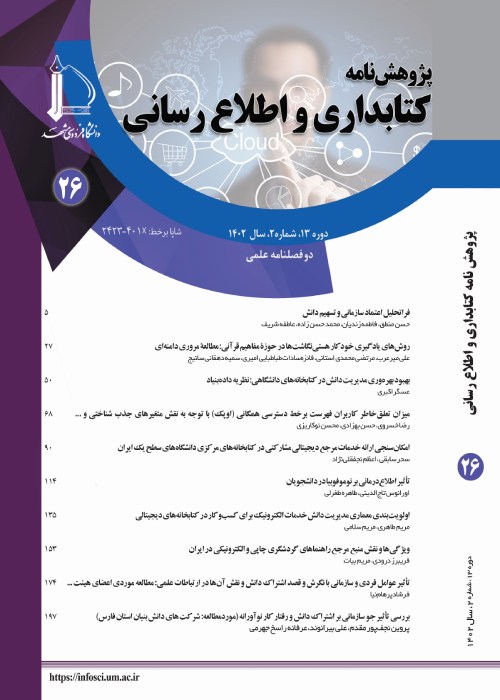Identifying the Indicators of the Conceptual Model of Knowledge Management Audit in the Libraries of Medical Sciences Universities in Iran
The resources of the organization are the main assets and skeleton of the organization. The most successful organizations are those that use their intangible assets faster and better; Among the important organizational intangible assets are knowledge and information. Knowledge and information drive the life of today's organizations more than factors such as capital, land or labor. Knowledge is the most important or strategic production factor; Knowledge is the most basic capital of organizations, including university libraries, and knowledge management is one of the important tools for the success of organizations in the information age. Knowledge audit is defined as the examination and measurement of knowledge used in the knowledge management system, as well as a tool for valuing knowledge and determining the opportunities and problems of knowledge management. Knowledge audit is a systematic evaluation of organizational knowledge health. Considering the importance of medical sciences libraries in the dissemination of health information and the role of knowledge management audit in the optimal implementation of knowledge management, the present study intends to identify the indicators of the conceptual model of knowledge management audit in the libraries of medical sciences universities in Iran.
The current research is a combination of quantitative and qualitative types and analytical survey. After formulating and setting the research questions and with the determination of the research objectives as well as the determination of the statistical population and statistical samples, the necessary data were collected with the help of smart PLS software and the questions were tested by analyzing them. In the use of library resources, the resources available in the library of the Program and Budget Organization, Islamic Council Research Center, Faculty of Management of Tehran University and Tarbiat Modarres University were used. In order to use electronic resources, the scientific information resources of the university were also used and the databases of electronic scientific journals in English, such as Science Direct, Scopus, Thomson Reuters, ProQuest, Wiley, Springer, OCD, Emerald, etc., were used. In addition, all Persian databases of scientific research publications of the University of Tehran, Namametn publications, the country's publications database, Noor specialized magazines, the scientific information database of academic Jihad, knowledge reference (articles of conferences and seminars) and most importantly the website of the Research Center of the Islamic Council and the organization of the budget program has been reviewed and an effort has been made to monitor all the issues worked in this field with a comprehensive view and use of them if they are related to the research topic. In order to identify the indicators of the conceptual model of knowledge management audit, the fuzzy Delphi method was used in two stages by 12 experts, of which 6 (50%) were men and 6 (50%) were women. All the people in the statistical population of the research had a doctorate degree, 58.3% had the scientific rank of assistant professor, and 66.7% had more than 15 years of experience in working with the university library. Second-order confirmatory factor analysis was used to validate the identified indicators. In order to validate the model, a questionnaire was conducted among 122 managers and librarians of medical sciences universities in Tehran, Shahid Beheshti, Iran, Isfahan, Mashhad, Kerman, Tabriz, Hamedan, Gilan, Hormozgan, Shiraz, Shahid Sadouqi of Yazd, Lorestan, Arak, Jundishapur of Ahvaz. It was distributed in Birjand where 111 people answered the questionnaire.
The conceptual model of knowledge management audit was obtained in three dimensions, 13 indicators and 55 sub-indices. The dimensions of the stage after the knowledge management audit with (0.8550), before the knowledge management audit with (0.8460) and during the implementation of knowledge management with (0.8430) were the most important.Discussion and
Internal researches have less discussed the knowledge audit and have mostly been done on knowledge management in different statistical populations. Often, in several areas, they have used the method of documentary study and with an analytical approach to comparative study and analysis of existing models and methodologies in the field of knowledge audit. In general, all models and methodologies are somewhat general and static in nature, and in order to be used in Different organizational environments do not have the necessary flexibility and agility; Limited researches have been done in the field of identifying dimensions and audit indicators of knowledge management. The main focus of researches outside of Iran includes examining the audit indicators of knowledge management in the evaluation of organizations and expressing the challenges of using quantitative methods to evaluate the quality of research in this field, investigating and identifying quantitative and qualitative indicators for evaluating research in different dimensions, introducing and expressing the importance of audit in knowledge management in the evaluation of organizations. In order to measure the importance of each of the knowledge management audit indicators, after analyzing the indicators with the help of factor analysis, a fitted factor model was designed to present a conceptual model of knowledge management audit in the libraries of medical sciences universities. The results showed the approval and acceptable fit of the conceptual model of knowledge management audit in the libraries of medical sciences universities.
- حق عضویت دریافتی صرف حمایت از نشریات عضو و نگهداری، تکمیل و توسعه مگیران میشود.
- پرداخت حق اشتراک و دانلود مقالات اجازه بازنشر آن در سایر رسانههای چاپی و دیجیتال را به کاربر نمیدهد.


